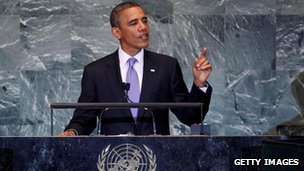Tuesday 25 September 2012 - 13:00
Story Code : 6204
Syria and Iran to overshadow UN General Assembly
World leaders are gathering in New York for a UN General Assembly likely to be dominated by Syria, although it is not formally on the agenda.
Discussions are also expected to centre on Iran's nuclear programme and the video that has prompted anti-US protests across the Muslim world.
President Barack Obama is due to focus on the Middle East when he gives one of the opening speeches on Tuesday.
His address comes six weeks before the US presidential election.
But it is not to be seen as a campaign speech, according to White House spokesman Jay Carney.
"I would expect the president to address the recent unrest in the Muslim world and the broader context of the democratic transitions of the Arab World."
'Extremely bad'
Syria's 18-month conflict is not formally on the UN General Assembly's agenda but it is likely to be addressed by several speakers on the opening day, including UN Secretary General Ban Ki-moon, French President Francois Hollande and Qatari emir Sheikh Hamad bin Khalifa Al-Thani.
Mr Hollande, in his first appearance at the assembly, is also expected to call for backing for an international force to be sent to the West African state of Mali to help dislodge Islamist militants who have taken over the north of the country.
The UN Security Council has been unable to reach agreement on the Syria crisis and on Monday UN envoy Lakhdar Brahimi warned that the situation was "extremely bad and getting worse".
While he did not have a full plan, he said he had "a few ideas". Mr Brahimi has just visited Damascus as well as refugee camps in neighbouring Jordan and Turkey.
The BBC's Barbara Plett says that diplomats have played down expectations for Mr Brahimi's mission, with no sign of fundamental divisions on the council being bridged.
'Fake regime'
In his speech, President Obama is also set to repeat a warning that Iran will not be allowed to acquire nuclear weapons.
But he has rejected calls from Israeli PM Benjamin Netanyahu for Washington to set Tehran "red lines". Tehran says its programme is for civilian purposes.
On the eve of the assembly, Iranian President Mahmoud Ahmadinejad told a UN meeting that Israel was a "fake regime", prompting Israel's UN ambassador, Ron Prosor, to walk out.
Mr Netanyahu has recently appeared on US television to press for a tougher line on Iran, and he will take the same message to the General Assembly on Thursday.
While Syria is not considered an issue for the US presidential election, Iran is, our correspondent says.
Republican presidential candidate Mitt Romney castigated his rival on Monday for not taking time out to meet the Israeli PM.
Mr Romney also criticised President Obama's description of the murder of US ambassador to Libya Christopher Stevens and three other Americans as "bumps in the road".
The Iran Project is not responsible for the content of quoted articles.
# Tags











